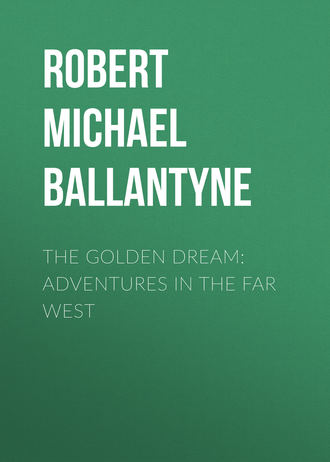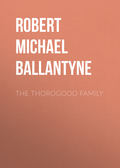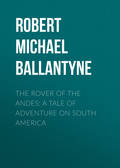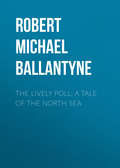
Robert Michael Ballantyne
The Golden Dream: Adventures in the Far West
Chapter Twenty One.
Curious Trees, and still more Curious Plains—An Interesting Discovery, followed by a Sad one—Fate of Travellers in the Mountains—A Sudden Illness—Ned proves himself to be a friend in Need and in Deed, as well as an Excellent Doctor, Hunter, Cook, and Nurse—Deer-Shooting by Firelight
During the course of their wanderings among the mountains our hero and his companion met with many strange adventures and saw many strange sights, which, however, we cannot afford space to dwell upon here. Their knowledge in natural history, too, was wonderfully increased, for they were both observant men, and the school of nature is the best in which any one can study. Audubon, the hunter-naturalist of America, knew this well! and few men have added so much as he to the sum of human knowledge in his peculiar department, while fewer still have so wonderfully enriched the pages of romantic adventure in wild, unknown regions.
In these wanderings, too, Ned and Tom learned to know experimentally that truth is indeed stranger than fiction, and that if the writers of fairy-tales had travelled more they would have saved their imaginations a deal of trouble, and produced more extraordinary works.
The size of the trees they encountered was almost beyond belief, though none of them surpassed the giant of which an account has been already given. Among other curious trees they found sugar-pines growing in abundance in one part of the country. This is, perhaps, the most graceful of all the pines. With a perfectly straight and cylindrical stem and smooth bark, it rears its proud crest high above other trees, and flings its giant limbs abroad, like a sentinel guarding the forest. The stem rises to about four-fifths of its height perfectly free of branches; above this point the branches spread out almost horizontally, drooping a little at the ends from the weight of the huge cones which they bear. These cones are about a foot-and-a-half long, and under each leaf lies a seed the size of a pea, which has an agreeably sweet taste, and is much esteemed by the Indians, who use it as an article of food.
Another remarkable sight they saw was a plain, of some miles in extent, completely covered with shattered pieces of quartz, which shone with specks and veins of pure gold. Of course they had neither time nor inclination to attempt the laborious task of pulverising this quartz in order to obtain the precious metal; but Ned moralised a little as they galloped over the plain, spurning the gold beneath their horses’ hoofs, as if it had been of no value whatever! They both puzzled themselves also to account for so strange an appearance; but the only solution that seemed to them at all admissible was, that a quartz vein had, at some early period of the world’s history, been shattered by a volcanic eruption, and the plain thus strewn with gold.
But from the contemplation of these and many other interesting sights and phenomena we must pass to an event which seriously affected the future plans of the travellers.
One beautiful evening—such an evening as, from its deep quiet and unusual softness, leaves a lasting impression on the memory—the two horsemen found themselves slowly toiling up the steep acclivity of a mountain-ridge. Their advance was toilsome, for the way was rugged, and no track of any kind assisted them in their ascent.
“I fear the poor horses will give in,” said Ned, dismounting and looking back at his companion, who slowly followed him.
“We are near the summit,” answered Tom, “and they shall have a long rest there.”
As he spoke, they both dismounted and advanced on foot, leading their fatigued horses by the bridles.
“Do you know,” said Tom, with a sigh, “I feel more used up to-day than I have been since we started on this journey. I think we had better encamp and have a cup of tea; there is a little left yet, if I mistake not.”
“With all my heart, Tom; I, too, feel inclined to rest, and—”
Ned paused, for at that moment they overtopped the highest edge of the ridge, and the view that burst upon them was well fitted to put to flight every previous train of thought.
The ridge on which they stood rose several hundred feet above the level of the plain beyond, and commanded a view of unknown extent towards the far west.
The richest possible sweep of country was spread out at their feet like a huge map, bathed in a glow of yellow sunshine. Lakes and streams, crags and rocks, sward, and swamp, and plain—undulating and abrupt, barren and verdant—all were there, and could be embraced in a single wide-sweeping glance. It seemed, to the entranced travellers, like the very garden of Eden. Water-fowl flew about in all directions, the whistling of their wings and their wild cries being mellowed by distance into pleasant music; and, far away on the right, where a clear lake mirrored each tree on its banks, as if the image were reality, a herd of deer were seen cooling their sides and limbs in the water, while, on the extreme horizon, a line of light indicated the shores of the vast Pacific Ocean.
Ere the travellers could find words to express their feelings, a rock, with a piece of stick and a small rag attached to it, attracted their attention.
“We are not the first who have set their feet here, it seems,” said Ned, pointing to the signal.
“Strange!” muttered Tom Collins, as they turned towards the rock; “that does not look like an Indian mark; yet I would have thought that white men had never stood here before, for the spot is far removed from any known diggings, and, as we know fail well, is not easily reached.”
On gaining the rock, they found that the rag was a shred of linen, without mark of any kind to tell who had placed it there.
“It must have been the freak of some Indian hunter,” said Ned, examining the rock on which the little flag-staff was raised. “Stay—no—here are some marks cut in the stone! Look here, Tom, can you decipher this? It looks like the letter D—DB.”
“DB?” cried Tom Collins, with a degree of energy that surprised his friend. “Let me see!”
Tom carefully removed the moss, and cleared out the letters, which were unmistakeable.
“Who can DB have been?” said Ned.
Tom looked up with a flushed countenance and a glittering eye, as he exclaimed—
“Who? Who but Daniel Boone, Cooper’s great hero—Hawk-eye, of the ‘Last of the Mohicans’—Deer-slayer—Leather-stocking! He has been here before us—ay, brave spirit! Long before other hunters had dared to venture far into the territory of the scalping, torturing, yelling red-skin, this bold heart had pushed westward, fearless and alone, until his eagle eye rested on the great Pacific. It must have been he. I have followed him, Ned, in spirit, throughout all his wild career, for I knew him to be a real man, and no fiction; but little did I think that I should see a spot where his manly foot had rested, or live to discover his farthest step in the ‘far west!’”
Ned Sinton listened with interest to the words of his friend, but he did not interrupt him, for he respected the deep emotions that swelled his heart and beamed from his flashing eye.
“We spoke, Ned, sometime ago, of historical associations,” continued Tom,—“here are historical associations worth coming all this way to call up. Here are associations that touch my heart more than all the deeds of ancient chivalry. Ah! Daniel Boone, little didst thou think when thy hawk’s eye rested here, that in a few short years the land would be overrun by gold-diggers from all ends of the earth!”
“But this flag,” said Ned; “he could never have placed that here. It would have been swept away by storms years ago.”
“You are right,” said Tom, turning over the stones that supported the staff—“halloo! what have we here?”
He pulled out a roll of oiled cloth as he spoke, and, on opening it, discovered a scrap of paper, on which were written, in pencil, the words, “Help us!—for God’s sake help us! We are perishing at the foot of the hill to the southward of this.”
No name or date was attached to this strange paper, but the purport of it was sufficiently clear so, without wasting time in fruitless conjecture, the young men immediately sprang on their horses, and rode down the hill in the direction indicated.
The route proved more rugged and steep than that by which they had ascended, and, for a considerable distance, they wound their way between the trunks of a closely-planted cypress grove; after passing which they emerged upon a rocky plain of small extent, at the further extremity of which a green oasis indicated the presence of a spring.
Towards this they rode in silence.
“Ah!” exclaimed Ned, in a tone of deep pity, as he reined up at the foot of an oak-tree, “too late!”
They were indeed too late to succour the poor creatures who had placed the scrap of paper on the summit of that mountain-ridge, in the faint hope that friendly hands might discover it in time.
Six dead forms lay at the foot of the oak, side by side, with their pale faces turned upwards, and the expression of extreme suffering still lingering on their shrunken features. It needed no living witness to tell their sad history. The skeletons of oxen, the broken cart, the scattered mining tools, and the empty provision casks, shewed clearly enough that they were emigrants who had left their homesteads in the States, and tried to reach the gold-regions of California by the terrible overland journey. They had lost their way among the dreary fastnesses of the mountains, travelled far from the right road to the mines, and perished at last of exhaustion and hunger on the very borders of the golden land. The grey-haired father of the family lay beside a young girl, with his arm clasped round her neck. Two younger men also lay near them, one lying as if, in dying, he had sought to afford support to the other. The bodies were still fresh, and a glance shewed that nearly all of them were of one family.
“Alas! Ned, had we arrived a few days sooner we might have saved them,” said Tom.
“I think they must have been freed from their pains and sorrows here more than a week since,” replied the other, fastening his horse to a tree, and proceeding to search the clothes of the unfortunates for letters or anything that might afford a clue to their identity. “We must stay here an hour or two, Tom, and bury them.”
No scrap of writing, however, was found—not even a book with a name on it—to tell who the strangers were. With hundreds of others, no doubt, they had left their homes, full of life and hope, to seek their fortunes in the land of gold; but the Director of man’s steps had ordered it otherwise, and their golden dreams had ended with their lives in the unknown wilderness.
The two friends covered the bodies with sand and stones, and, leaving them in their shallow grave, pursued their way; but they had not gone far when a few large drops of rain fell, and the sky became overcast with dark leaden clouds.
“Ned,” said Tom, anxiously, “I fear we shall be caught by the rainy season. It’s awkward being so far from the settlements at such a time.”
“Oh, nonsense! surely you don’t mind a wetting?” cried Ned; “we can push on in spite of rain.”
“Can we?” retorted Tom, with unwonted gravity. “It’s clear that you’ve never seen the rainy season, else you would not speak of it so lightly.”
“Why, man, you seem to have lost pluck all of a sudden; come, cheer up; rain or no rain, I mean to have a good supper, and a good night’s rest; and here is just the spot that will suit us.”
Ned Sinton leaped off his horse as he spoke, and, fastening him to a tree, loosened the saddle-girths, and set about preparing the encampment. Tom Collins assisted him; but neither the rallying of his comrade, nor his own efforts could enable the latter to shake off the depression of spirits with which he was overpowered. That night the rain came down in torrents, and drenched the travellers to the skin, despite their most ingenious contrivances to keep it out. They spent the night in misery, and when morning broke Ned found that his companion was smitten down with ague.
Even Ned’s buoyant spirits were swamped for a time at this unlooked-for catastrophe; for the dangers of their position were not slight. It was clear that Tom would not be able to travel for many days, for his whole frame trembled, when the fits came on, with a violence that seemed to threaten dislocation to all his joints. Ned felt that both their lives, under God, depended on his keeping well, and being able to procure food for, and nurse, his friend. At the same time, he knew that the rainy season, if indeed it had not already begun, would soon set in, and perhaps render the country impassable. There was no use, however, in giving way to morbid fears, so Ned faced his difficulties manfully, and, remembering the promise which he had given his old uncle at parting from him in England, he began by offering up a short but earnest prayer at the side of his friend’s couch.
“Ned,” said Tom, sadly, as his companion ceased, “I fear that you’ll have to return alone.”
“Come, come, don’t speak that way, Tom; it isn’t right. God is able to help us here as well as in cities. I don’t think you are so ill as you fancy—the sight of these poor emigrants has depressed you. Cheer up, my boy, and I’ll let you see that you were right when you said I could turn my hand to anything. I’ll be hunter, woodcutter, cook, and nurse all at once, and see if I don’t make you all right in a day or two. You merely want rest, so keep quiet for a little till I make a sort of sheltered place to put you in.”
The sun broke through the clouds as he spoke and shed a warm beam down on poor Tom, who was more revived by the sight of the cheering orb of day than by the words of his companion.
In half-an-hour Tom was wrapped in the driest portion of the driest blanket; his wet habiliments were hung up before a roaring fire to dry, and a rude bower of willows, covered with turf, was erected over his head to guard him from another attack of rain, should it come; but it didn’t come. The sun shone cheerily all day, and Ned’s preparations were completed before the next deluge came, so that when it descended on the following morning, comparatively little found its way to Tom’s resting-place.
It was scarcely a resting-place, however. Tom turned and groaned on his uneasy couch, and proved to be an uncommonly restive patient. He complained particularly when Ned left him for a few hours each day to procure fresh provisions; but he smiled and confessed himself unreasonable when Ned returned, as he always did, with a dozen wild ducks, or several geese or hares attached to his belt, or a fat deer on his shoulders. Game of all kinds was plentiful, the weather improved, the young hunter’s rifle was good, and his aim was true, so that, but for the sickness of his friend, he would have considered the life he led a remarkably pleasant one.
As day after day passed by, however, and Tom Collins grew no better, but rather worse, he began to be seriously alarmed about him. Tom himself took the gloomiest view of his case, and at last said plainly he believed he was dying. At first Ned sought to effect a cure by the simple force of kind treatment and care; but finding that this would not do, he bethought him of trying some experiments in the medicinal way. He chanced to have a box of pills with him, and tried one, although with much hesitation and fear, for he had got them from a miner who could not tell what they were composed of, but who assured him they were a sovereign remedy for the blues! Ned, it must be confessed, was rather a reckless doctor. He was anxious, at the time he procured the pills, to relieve a poor miner who seemed to be knocked up with hard work, but who insisted that he had a complication of ailments; so Ned bought the pills for twenty times their value, and gave a few to the man, advising him, at the same time, to rest and feed well, which he did, and the result was a complete cure.
Our hero did not feel so certain, however, that they would succeed as well in the present case; but he resolved to try their virtues, for Tom was so prostrate that he could scarcely be induced to whisper a word. When the cold fit seized him he trembled so violently that his teeth rattled in his head; and when that passed off it was followed by a burning fever, which was even worse to bear.
At first he was restive, and inclined to be peevish under his illness, the result, no doubt, of a naturally-robust constitution struggling unsuccessfully against the attacks of disease, but when he was completely overcome, his irascibility passed away, and he became patient, sweet-tempered, and gentle as a child.
“Come, Tom, my boy,” said Ned, one evening, advancing to the side of his companion’s couch and sitting down beside him, while he held up the pill—“Open your mouth, and shut your eyes, as we used to say at school.”
“What is it?” asked the sick man, faintly.
“Never you mind; patients have no business to know what their doctors prescribe. It’s intended to cure ague, and that’s enough for you to know. If it doesn’t cure you it’s not my fault, anyhow—open your mouth, sir!”
Tom smiled sadly and obeyed; the pill was dropt in, a spoonful of water added to float it down, and it disappeared.
But the pill had no effect whatever. Another was tried with like result—or rather with like absence of all result, and at last the box was finished without the sick man being a whit the better or the worse for them. This was disheartening; but Ned, having begun to dabble in medicines, felt an irresistible tendency to go on. Like the tiger who has once tasted blood, he could not now restrain himself.
“I think you’re a little better to-night, Tom,” he said on the third evening after the administration of the first pill; “I’m making you a decoction of bark here that will certainly do you good.”
Tom shook his head, but said nothing. He evidently felt that a negative sign was an appropriate reply to the notion of his being better, or of any decoction whatever doing him good. However, Ned stirred the panful of bark and water vigorously, chatting all the while in a cheering tone, in order to keep up his friend’s spirits, while the blaze of the camp-fire lit up his handsome face and bathed his broad chest and shoulders with a ruddy glow that rendered still more pallid the lustre of the pale stars overhead.
“It’s lucky the rain has kept off so long,” he said, without looking up from the mysterious decoction over which he bent with the earnest gaze of an alchymist. “I do believe that has something to do with your being better, my boy—either that or the pills, or both.”
Ned totally ignored the fact that his friend did not admit that he was better.
“And this stuff,” he continued, “will set you up in a day or two. It’s as good as quinine, any day; and you’ve no notion what wonderful cures that medicine effects. It took me a long time, too, to find the right tree. I wandered over two or three leagues of country before I came upon one. Luckily it was a fine sunny day, and I enjoyed it much. I wish you had been with me, Tom; but you’ll be all right soon. I lay down, too, once or twice in the sunshine, and put my head in the long grass, and tried to fancy myself in a miniature forest. Did you ever try that, Tom!”
Ned looked round as he spoke, but the sick man gave a languid smile, and shut his eyes, so he resumed his stirring of the pot and his rambling talk.
“You’ve no idea, if you never tried it, how one can deceive one’s-self in that way. I often did it at home, when I was a little boy. I used to go away with a companion into a grass-field, and, selecting a spot where the grass was long and tangled, and mixed with various kinds of weeds, we used to lie flat down with our faces as near to the ground as possible, and gaze through the grass-stems until we fancied the blades were trees, and the pebbles were large rocks, and the clods were mountains. Sometimes a huge beetle would crawl past, and we instantly thought of Saint George and the dragon, and, as the unwieldy monster came stumbling on through the forest, we actually became quite excited, and could scarcely believe that what we tried to imagine was not real.
“We seldom spoke on these occasions, my companion and I,” continued Ned, suspending the stirring of the decoction and filling his pipe, as he sat down close to the blazing logs; “speaking, we found, always broke the spell, so we agreed to keep perfect silence for as long a time as possible. You must try it, Tom, some day, for although it may seem to you a childish thing to do, there are many childish things which, when done in a philosophical spirit, are deeply interesting and profitable to men.”
Ned ceased talking for a few minutes while he ignited his pipe; when he spoke again his thoughts had wandered into a new channel.
“I’m sorry we have no fresh meat to-day,” he said, looking earnestly at his friend. “The remainder of that hare is not very savoury, but we must be content; I walked all the country round to-day, without getting within range of any living thing. There were plenty both of deer and birds, but they were so wild I could not get near them. It would matter little if you were well, Tom, but you require good food just now, my poor fellow. Do you feel better to-night?”
Tom groaned, and said that he “felt easier,” in a very uneasy voice, after which they both relapsed into silence, and no sound was heard save the crackling of the logs and the bubbling of the mysterious decoction in the pot. Suddenly Tom uttered a slight hiss,—that peculiar sound so familiar to backwoods ears, by which hunters indicate to each other that something unusual has been observed, and that they had better be on the alert.
Ned Sinton’s nerves were of that firm kind which can never be startled or taken by surprise. He did not spring to his feet, but, quick as thought, he stretched forth his long arm, and, seizing his rifle, cocked it, while he glanced at his friend’s eye to see in what direction he was looking. Tom pointed eagerly with his thin hand straight across the fire. Ned turned in that direction, and at once saw the objects which had attracted his attention. Two bright gleaming balls shone in the dark background of the forest, like two lustrous Irish diamonds in a black field of bog-oak. He knew at once that they were the eyes of a deer, which, with a curiosity well-known as peculiar to many wild animals, had approached the fire to stare at it.
Ned instantly threw forward his rifle; the light of the fire enabled him easily to align the sights on the glittering eyes; the deadly contents belched forth, and a heavy crash told that his aim had been true.
“Bravo!” shouted Tom Collins, forgetting his ailments in the excitement of the moment, while Ned threw down his rifle, drew his hunting-knife, sprang over the fire, and disappeared in the surrounding gloom. In a few minutes he returned with a fine deer on his shoulders.
“So ho! my boy,” he cried, flinging the carcase down; “that was a lucky shot. We shall sup well to-night, thanks to curiosity, which is a most useful quality in beast as well as man. But what’s wrong; you look pale, and, eh? you don’t mean to say you’re—laughing?”
Tom was indeed pale, for the sudden excitement, in his exhausted condition had been too much for him; yet there did seem a peculiar expression about the corners of his mouth that might have been the remains of a laugh.
“Ned,” he said, faintly, “the—the decoction’s all gone.” Ned sprang up and ran to the fire, where, sure enough, he found the pan, over which he had bent so long with necromantic gaze, upset, and most of the precious liquid gone.
“Ha!” he cried, catching up the pot, “not all gone, lad, so your rejoicing was premature. There’s quite enough left yet to physic you well; and it’s in fit state to be taken, so open your mouth at once, and be a good boy.”
A little of the medicine, mixed in water, was administered, and Tom, making a wry face, fell back on his couch with a sigh. Immediately after he was seized with, perhaps, the severest shaking fit he had yet experienced, so that Ned could not help recalling the well-known caution, so frequently met with on medicine vials, “When taken, to be well shaken,” despite the anxiety he felt for his friend. But soon after, the trembling fit passed away, and Tom sank into a quiet slumber,—the first real rest he had enjoyed for several days.
Ned felt his pulse and his brow, looked long and earnestly into his face, nodded approvingly once or twice, and, having tucked the blankets gently in round the sick man, he proceeded to prepare supper. He removed just enough of the deer’s skin to permit of a choice morsel being cut out; this he put into the pot, and made thereof a rich and savoury soup, which he tasted; and, if smacking one’s lips and tasting it again twice, indicated anything, the soup was good. But Ned Sinton did not eat it. That was Tom’s supper, and was put just near enough the fire to keep it warm.
This being done, Ned cut out another choice morsel of deer’s-meat, which he roasted and ate, as only those can eat who are well, and young, and robust, and in the heart of the wilderness. Then he filled his pipe, sat down close to Tom’s couch, placed his back against a tree, crossed his arms on his breast, and smoked and watched the whole night long.
He rose gently several times during the night, however, partly for the purpose of battling off his tendency to sleep, and partly for the purpose of replenishing the fire and keeping the soup warm.
But Tom Collins took no supper that night. Ned longed very much to see him awake, but he didn’t. Towards morning, Ned managed for some time to fight against sleep, by entering into a close and philosophical speculation as to what was the precise hour at which that pot of soup could not properly be called supper, but would merge into breakfast. This question still remained unsettled in his mind when grey dawn lit up the peaks of the eastern hills, and he was still debating it, and nodding like a Chinese mandarin, and staring at intervals like a confused owl, when the sun shot over the tree-tops, and, alighting softly on the sleeper’s face, aroused him.
Tom awoke refreshed, ate his breakfast with relish, took his medicine without grumbling, smiled on his comrade, and squeezed his hand as he went to sleep again with a heavy sigh of comfort. From that hour he mended rapidly, and in a week after he was well enough to resume his journey.







